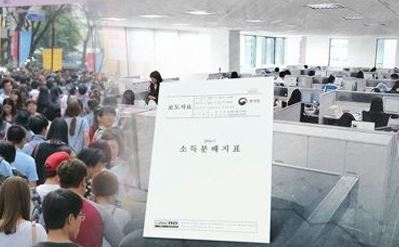Consumer sentiment among low-income earners declining: data
By Park Ju-youngPublished : July 9, 2017 - 13:09
Consumer sentiment among low-income earners have deteriorated despite upbeat forecasts fueled by strong exports and public expectations that the new Moon Jae-in administration will help propel growth, official data showed Sunday.
According to findings by the Bank of Korea, the consumer sentiment index among the country's underprivileged making less than 2 million won ($1,730) per month headed south in direct contrast to high-income earners, who had a more rosy picture about the future.
According to findings by the Bank of Korea, the consumer sentiment index among the country's underprivileged making less than 2 million won ($1,730) per month headed south in direct contrast to high-income earners, who had a more rosy picture about the future.

"While people making a lot of money believed things will look up a year down the road, those making very little expected conditions to get worse," the central bank data revealed.
The BOK's June household consumer sentiment index for those making less than 2 million won but more than 1 million won stood at 95, down 1 point from a year earlier. Numbers for people making less than 1 million backtracked 3 points to 94 from June 2016.
A reading below the benchmark 100 means people were pessimistic about the future, while a reading above this translates into greater optimism.
The CSI for high-income earners making more than 5 million won on a monthly basis stood at 108, up a sharp 6 points on-year last month.
Corresponding CSI numbers for those making between 4-5 million won, 3-4 million won and 2-3 million won all rose in June.
The BOK said it conducted the poll on 2,200 households nationwide.
Reflecting challenging times, the country's statistical office said the country's Gini coefficient that measures inequality in distribution of income, edged up 0.009 to 0.304 last year. Higher numbers mean more income inequality.
Such changes are of concern because many economists have said inequality in wealth distribution hurts consumption and fuels frustration that can hold up growth.
The BOK, meanwhile, has stepped up its warnings regarding problems with wealth distribution, rising household debt and the rapidly aging population.
Top bank officials stressed that a larger gap between the haves and have-nots will adversely affect not only economic expansion but hiring that is detrimental for sustainable growth. (Yonhap)
The BOK's June household consumer sentiment index for those making less than 2 million won but more than 1 million won stood at 95, down 1 point from a year earlier. Numbers for people making less than 1 million backtracked 3 points to 94 from June 2016.
A reading below the benchmark 100 means people were pessimistic about the future, while a reading above this translates into greater optimism.
The CSI for high-income earners making more than 5 million won on a monthly basis stood at 108, up a sharp 6 points on-year last month.
Corresponding CSI numbers for those making between 4-5 million won, 3-4 million won and 2-3 million won all rose in June.
The BOK said it conducted the poll on 2,200 households nationwide.
Reflecting challenging times, the country's statistical office said the country's Gini coefficient that measures inequality in distribution of income, edged up 0.009 to 0.304 last year. Higher numbers mean more income inequality.
Such changes are of concern because many economists have said inequality in wealth distribution hurts consumption and fuels frustration that can hold up growth.
The BOK, meanwhile, has stepped up its warnings regarding problems with wealth distribution, rising household debt and the rapidly aging population.
Top bank officials stressed that a larger gap between the haves and have-nots will adversely affect not only economic expansion but hiring that is detrimental for sustainable growth. (Yonhap)


![[Exclusive] Korean military set to ban iPhones over 'security' concerns](http://res.heraldm.com/phpwas/restmb_idxmake.php?idx=644&simg=/content/image/2024/04/23/20240423050599_0.jpg&u=20240423183955)

![[Graphic News] 77% of young Koreans still financially dependent](http://res.heraldm.com/phpwas/restmb_idxmake.php?idx=644&simg=/content/image/2024/04/22/20240422050762_0.gif&u=)



![[Pressure points] Leggings in public: Fashion statement or social faux pas?](http://res.heraldm.com/phpwas/restmb_idxmake.php?idx=644&simg=/content/image/2024/04/23/20240423050669_0.jpg&u=)









